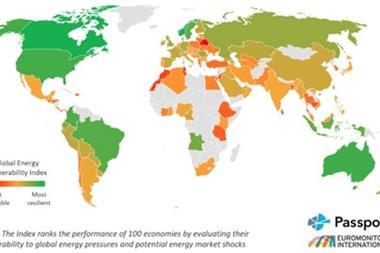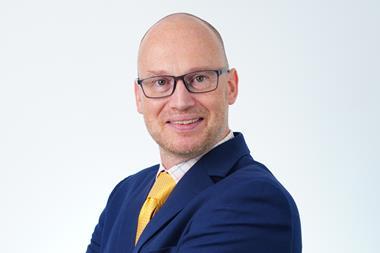Investment brokers in Eastern Europe are situated in one of the fastest-developing regions in the world. Some countries have seen GDP rising at 7% or more for consecutive years, and foreign investment is actively pursued as a key to continued growth. At the same time, brokers are establishing their reputations - often while dealing with local clients and distant investors who may be unaware of the realities involved in the other party's world. Eliminating the risk of spoiling a brokerage's reputation and ability to work on the market comes down to corporate disclosure.
What an investor or a local client reveals about itself, and how it does so, is even more important in the world of unruly, sometimes literally cut-throat, capitalism emerging from the post-Soviet era than it is elsewhere.
Concorde Capital in Kyiv, Ukraine, is one such brokerage house. It has dealt with practically every aspect of conveying information between parties, both informal and formal. John Suggitt, managing partner at Concorde Capital, says that, "problems in the former make life difficult, but problems in the latter make business impossible." Fortunately, after several successes, Concorde Capital has learned how to effectively manage the often manic effort that bringing two firms together entails.
Legal tangles
While accounting issues are often foremost on most potential investors' minds, Suggitt warns that almost every aspect of a business is liable to have problems and that everything must be taken into consideration.
"Even although it looks as if the government of Ukraine is not going to annul any more sales of industrial units, the reprivatisation of Kryvorizhstal in 2005 should serve as a warning to anyone buying into a property or a company in the region. Due diligence should include the basis on which a firm was created or privatised, whenever possible."
Real estate issues are particularly thorny. The resort area of Crimea, for example, is now the site of several investigations into the legality of land sales. Allegations of subletting by Russian officials in Sevastopol, in violation of the Ukrainian-Russian Federation agreement concerning the Black Sea Fleet, have surfaced, and there are calls for the creation of a bilateral commission to examine both the claims of impropriety and the treaty itself. "Making sure that real estate has been privatised or purchased properly is an imperative part of the investment process," Suggitt emphasises. "The situation is getting better, but we still see cases where cutting corners has resulted in competing claims of ownership - sometimes done on purpose." The risk involved in purchases of real estate which has no clear succession of ownership since privatisation is particularly high.
Corporate ownership can be an even more confusing issue. Suggitt notes that firms that have not engaged legal and financial experts to prepare themselves for foreign interaction often do not understand the extent of the problem. "In the past, extensive countermeasures were used by enterprise owners to prevent what might be called 'extreme intervention' by previous administrations. Opaque ownership relations kept the tax police, competitors, and anyone with a grudge, from using administrative pressure against them.
And, since most of these people have had little exposure to other ways of doing business until very recently, it is no wonder that they will not change their way of running their firms overnight." He recommends that any investor new to Eastern Europe make use of the local office of any of the internationally-known law firms, in order to have the company's structure examined by someone who understands both mindsets.
A matter of record
One example of a successful transition from a post-Soviet business to an investor-worthy enterprise is Kremenchuk Avto Zavod (KrAZ), which makes heavy-duty all-terrain trucks. The KrAZ board of directors approached Concorde Capital in late October, 2004 - the first step in a long process.
"Getting the management structure straightened out was an important step in preparing KrAZ for foreign investors. We needed to make them understand that it was more advantageous for them to go down this route and bring in a capital infusion than it was to continue in the old way of doing things. It took two months and a feasibility study to show their board of directors what they were missing." Once the board chose the direction they wanted to move towards, though, radical change was possible.
One important step that KrAZ made was to agree to bring an external investor representative onto the board. Nicholas Enukidze, corporate finance director at Concorde Capital, points out that the decision was bold, given the times, but is becoming more common. "Until recently, minority shareholder privileges were often abused by both majority and minority shareholders.
Commercial courts anywhere in Ukraine, for example, are allowed to hear cases, and finding a sympathetic judge far from the primary shareholder's normal circle of influence was not difficult." With several successes to point to, though, Enukidze says that bringing investor representatives on to the board is becoming easier.
A company such as KrAZ, which is willing to adapt its structure, is a far safer opportunity than many in Eastern Europe. Knowing where this willingness exists lets brokers bring up issues that might surprise newcomers.
Enukidze remarks that, "We have told potential investors, 'we have found a great little company, which makes a solid product and has smart management, but needs a good CFO. If you insist on a change in their financial operations management, it will work.'"
Ownership is only one of several legal issues that can be difficult to resolve. Legislation in Eastern Europe is often vague, and sometimes contradictory.
Government officials are often reluctant to give an opinion, even when asked directly. Knowing as much as possible about the firm itself will help to reduce politically-related risk. The intensity of issues involving politics, competing business groups and government interference vary from country to country and even differ among the various regions within one nation. Attention paid to this will avoid problems.
Trading issues
Concorde Capital's feasibility study for KrAZ uncovered something endemic to the region, which is not often considered by novice investors. Soviet-era trade patterns were carried over into the new environment, partly because it was a way to deal with known entities, and partly to avoid taxation issues. "KrAZ had traditional partners in Russia that it had been dealing with in the old days, and exports to Russia were handled in an opaque manner. We could see that the partner benefited, but we pointed out to the board that rationalising their sales structure would be to their own advantage." While barter and tolling schemes are not as common as they used to be, careful attention should be given to both raw material inputs and sales channels in order to minimise the risk of VAT problems, opaque partnerships and smuggling.
By far the most common issue when looking at an investment opportunity in Eastern Europe will be the condition of the corporate finances. It should be noted that it used to be common practice in Eastern Europe to have three sets of accounting books at the same time - one for the tax inspectors, one to show the firm's partners and minority owners, and one for the primary shareholder himself. The figures would rarely, if ever, match. In many cases, a good broker will have already worked with the firm to bring them to an understanding of what is needed, but only the company's board of directors can actually engage a well-recognised and thorough firm to consolidate the accounts. "When we looked at the KrAZ financials for the first time, we saw a lot of reporting that needed clarification.
For instance, we found assets listed that were actually liabilities. It was obvious that a lot more transparency was required before anyone would invest," says Enukidze. In other cases, wage arrears might exist, or be covered by loans, although this was not a problem that KrAZ had.
Companies in Eastern Europe are quickly learning that having a Big Four firm audit the books helps in ways they did not expect at first. Suggitt says that, "even hostile tax inspectors - and there are still some in the region - are going to treat accounts monitored by the best firms in a different light." In a region where Byzantine tax codes are the norm, expert auditing can be a crucial factor, not just in financing, but also in government relations.
Enukidze quips that, "The days where a firm's director would want to start cognac toasts at ten o'clock in the morning are gone, especially in the larger companies." However, a lot of education still has to take place before introductions to potential investors can be made. "We are proactive when it comes to grooming a client now," Suggitt remarks. "We established our corporate finance department in order to show the businessmen coming to us why rational business practices work better, and how they can reduce both the financial and legal risk to their companies." Hence, reducing risk for an international investor also reduces the likelihood of problems for the owners themselves.
"These are intelligent people, who in most cases had nothing five or ten years ago and now are worth tens of millions of dollars," Enukidze points out. "They are sharp, and they learn quickly."
Becoming ready for prime time
Although the cognac bottle stays shelved in the morning, Eastern European companies reaching out for the first time still have a lot of polishing to do, especially when it comes to presentations. Suggitt says that, "The old system of presenting a company focused largely on the technical aspects of whatever was being made. Lead engineers were brought in and every part described in detail. It takes some reorientation to create a presentation devoted to business fundamentals and opportunities." Likewise, Concorde Capital finds that communication with the potential investor reduces the risk of being put off. "One focus for us is letting the team coming in know what they will hear," Enukidze adds.
Business practices in Eastern Europe are quickly changing to meet, and sometimes create demand for investors. The risk taken by brokers to introduce local and regional operators to the international investing environment is higher than in developed countries, but the rewards for careful work in organising proper corporate disclosure and communication are already being seen.
- James Hydzik is a business writer specialising in Central and Eastern Europe, and is based in Kyiv, Ukraine.



















